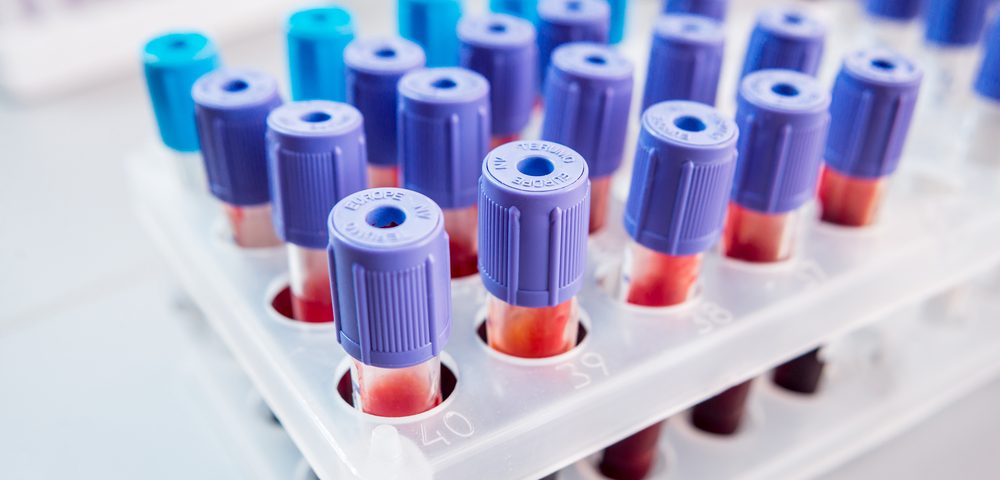Researchers have identified novel biomarkers for diagnosing Crohn’s disease in a collaborative study between Arizona State University’s Biodesign Institute and the Mayo Clinic. They also built a novel blood test that distinguishes patients from healthy individuals.
Their study, “Identification of antibody against SNRPB, small nuclear ribonucleoprotein-associated proteins B and B’, as an autoantibody marker in Crohn’s disease using an immunoproteomics approach,” appeared in the Journal of Crohn’s and Colitis.
Crohn’s disease is caused by inflammation in the digestive tract, and diagnosing it can be quite expensive and invasive. So scientists were eager to discover valuable molecules, or biomarkers, found only in Crohn’s patients and that could be detected with a simple blood test.
“To truly alter the natural history of Crohn’s disease and help people, we needed to develop a new test for early, accurate diagnosis, as well as administrating appropriate therapy,” Josh LaBaer, interim executive director of the Biodesign Institute, said in a news release.
“Increasing evidence suggests the Crohn’s disease immune response may be a result of altered microbes in the gut or exposure to harmful toxins that will result in antibodies against microbial and human proteins being made that are very specific manifestation of the disease,” said LaBaer’s colleague, Ji Qiu. “Many blood-based biomarkers have been discovered, but currently commercially available blood tests have not been widely adapted into clinical practice because they fail to accurately diagnose Crohn’s disease.”
To look for suitable biomarkers, researchers analyzed blood samples from 48 Crohn’s patients and age- and gender-matched healthy individuals. Samples were taken from Biobanks at Mayo Clinic Rochester and Mayo Clinic Arizona.
The study identified several autoantibodies — or antibodies produced by the immune system against the patient’s own tissues — that presented more than 15 percent sensitivity in detecting Crohn’s. These potential biomarkers were then validated in another group of patients and healthy individuals. Researchers then chose the best samples to produce a biomarker panel to build their diagnostic test as accurately as possible.
“Biomarker studies can be plagued with issues of sensitivity and specificity,” Qiu said. “If we ultimately want to use these as routine tests in the clinic, we have to ensure that that they have the required classification performance in distinguishing patients from healthy controls and other gut disorders.”
The team then compared the efficiency in blood samples from patients and healthy controls using an available array of proteins on a chip (a costly and timely test called DNASU) and their novel test (called NAPPA), which involves making fresh protein from samples at the time of the test. Results indicated that antibodies against bacterial flagellin were the strongest biomarkers in detecting Crohn’s, with 46 percent sensitivity and 95 percent specificity. They also detected an antibody against a protein called SNRPB, which is involved in lupus, another autoimmune disorder.
“One possibility is that these antibodies reflect dysregulated immune response in the gut,” LaBaer said. “Another is that they could play a pathogenic role. But so far, we simply don’t have enough such antibodies discovered to understand their functional role.”
The team plans to continue looking for potential biomarkers of Crohn’s, as many proteins may be involved in inflammatory processes damaging the gut.
Crohn’s currently afflicts about three of 1,000 Americans, and for some unknown reason, its incidence is on the rise. Crohn’s is often associated with chronic, debilitating stomach pain, diarrhea and other symptoms that may come and go. One in five people will have to be hospitalized each year, and surgery may eventually be required for the most severely afflicted.
“Ultimately, we know that no single biomarker is going to be predictive and meet clinical needs,” LaBaer said. “Only a panel of biomarkers, made of individually validated biomarkers, will achieve the best performance in the clinic. But we are excited about the potential of this immunoproteomics approach for Crohn’s disease and will work to discover additional biomarkers.”

